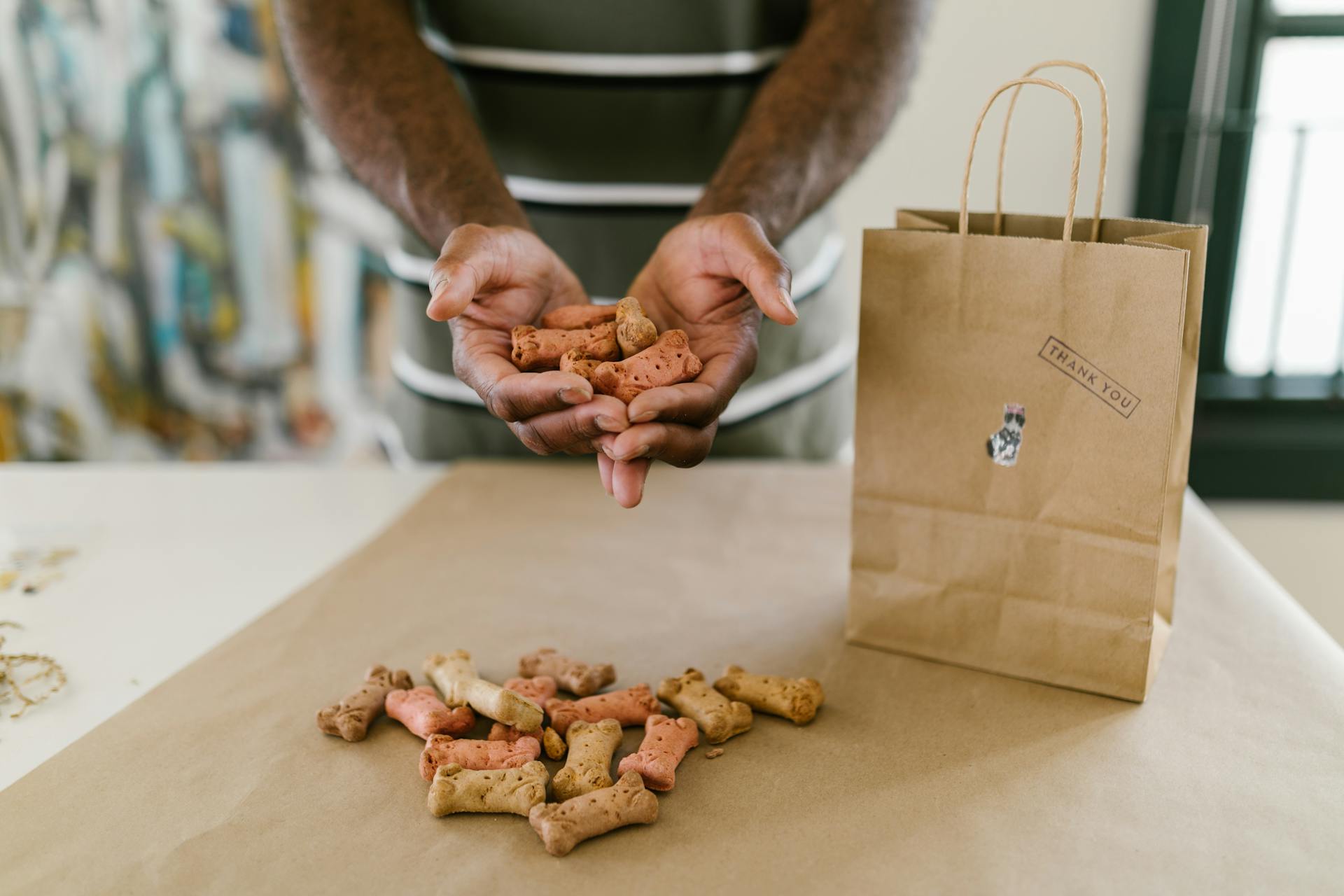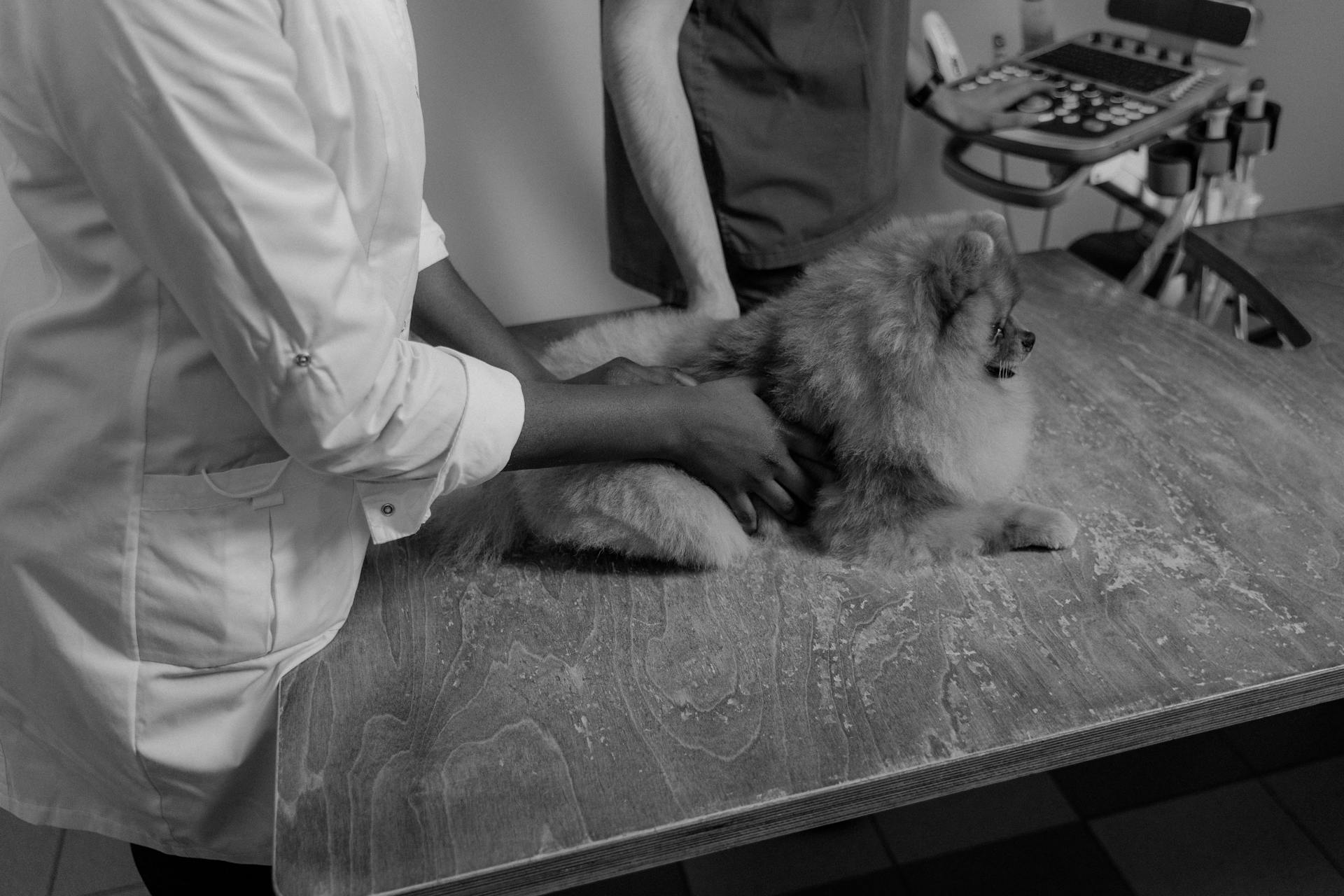
Dogs eating raisins can be a serious issue, and it's essential to know the facts to keep your furry friend safe.
Raisins are toxic to dogs, and even small amounts can cause harm. The exact mechanism of how raisins affect dogs is still unknown, but it's clear that they can cause kidney failure.
The toxic compound in raisins is not yet identified, but it's believed to be a glycoside. This means that even if a raisin is broken down, the toxic compound can still be present.
If you suspect your dog has ingested raisins, it's crucial to act fast. Keep an eye on your dog's behavior and watch for signs of illness, such as vomiting, diarrhea, or lethargy.
Expand your knowledge: Yogurt Covered Raisins
Health Risks of Raisins for Dogs
Grapes and raisins can be extremely toxic to dogs, even in small amounts.
The effects of grape and raisin toxicity in dogs can be severe, including sudden kidney failure, which can be life-threatening depending on the size of your dog.
Some dogs are more sensitive to grapes and raisins than others, and the reason why this is the case remains unclear.
Even a small number of grapes or raisins can cause severe health problems in dogs, making it essential to keep them out of reach.
Grapes and raisins can be hidden in various food products, such as baked goods and trail mix, so it's crucial to carefully read the ingredients before sharing them with your dog.
All family members and house guests should understand the dangers of feeding grapes or raisins to dogs to ensure their safety and well-being.
Explore further: Can Dogs Die from Eating Grapes
What to Do If Your Dog Eats Raisins
If your dog eats raisins, it's crucial to act quickly and decisively. Contact your veterinarian, an emergency animal poison control hotline, or a televet immediately to provide them with information about your dog's breed, age, weight, and the quantity of raisins consumed.
Grapes and raisins are extremely toxic to dogs, and even a small amount can cause severe symptoms. If your dog eats a small raisin, it's essential to seek advice from your veterinarian or an emergency animal hospital right away.
Signs of raisin toxicity in dogs include vomiting, diarrhea, lethargy, loss of appetite, abdominal pain, weakness, dehydration, and increased or decreased urination. If you notice any of these symptoms, seek immediate veterinary attention.
Grapes and raisins can lead to kidney failure in dogs, even if symptoms don't appear right away. If your dog eats raisins but seems fine, it's still essential to take action and contact your veterinarian immediately.
The sooner you intervene, the better the prognosis for your dog. Prompt action can make a significant difference in your dog's outcome. Don't wait to see if your dog exhibits symptoms before seeking veterinary help.
Here are some key steps to take if your dog eats raisins:
- Contact your veterinarian, an emergency animal poison control hotline, or a televet immediately
- Provide information about your dog's breed, age, weight, and the quantity of raisins consumed
- Follow your veterinarian's guidance on whether to induce vomiting or seek immediate veterinary attention
- Monitor your dog closely for signs of raisin toxicity and seek immediate veterinary attention if you notice any symptoms
Remember, an ounce of prevention is worth a pound of cure when it comes to grape and raisin toxicity in dogs. The sooner you seek help, the better the chances of a positive outcome for your furry friend.
Preventing and Treating Raisin Toxicity
The average cost of treating grape toxicity in dogs can range from $100 to $250 for emergency veterinary visits, and up to $500 for medications and supportive care.
To prevent raisin toxicity in dogs, it's essential to keep all grapes, raisins, and foods containing these fruits out of reach of your pets. This includes checking for hidden sources in pantry items, handbags, and backpacks.
Educating family members, friends, and house guests about the dangers of feeding grapes or raisins to dogs is crucial in preventing accidental ingestion. You can also consider placing warning signs in areas where grapes or raisins are commonly consumed.
If your dog has ingested raisins, it's essential to act quickly and seek immediate veterinary attention. The most common early symptom of grape or raisin toxicity is vomiting, which is generally seen within 24 hours following ingestion.
Here are some key steps to take if your dog has ingested raisins:
- Induce vomiting within 4 to 6 hours of consumption
- Monitor kidney values and administer intravenous fluids to flush the toxin from the body and support kidney function
- Provide a quiet, comfortable environment to help your dog recuperate and follow the veterinarian's recommendations diligently
Toxicity Symptoms
Symptoms of grape or raisin toxicity can appear within 12-24 hours after ingestion, and may include stomach upset, vomiting, loss of appetite, diarrhea, and lethargy.
If your dog has eaten grapes or raisins, be on the lookout for vomiting, which is generally seen within 24 hours following ingestion. Lack of appetite, lethargy, and possibly diarrhea can also be seen within the next 12-24 hours.
More severe signs of acute kidney failure, such as nausea, lack of appetite, vomiting, uremic breath, diarrhea, abdominal pain, excessive thirst, and excessive urination, may not be seen until 24-48 hours after ingestion. These signs can be a result of acute kidney damage that has already begun.
Some common signs of grape or raisin toxicity in dogs include vomiting, diarrhea, lethargy, loss of appetite, abdominal pain, weakness, dehydration, and increased or decreased urination. If you notice any of these symptoms and suspect that your dog has eaten grapes or raisins, acting quickly and seeking immediate veterinary attention is crucial.
For more insights, see: Raisin Bread
Here are some key symptoms to watch out for:
- Vomiting (which occurs in almost all dogs who eat grapes and end up in kidney failure)
- Diarrhea (which may contain grape or raisin pieces)
- Lethargy
- Increased thirst in dogs
- Dry nose and mouth (or other signs of dehydration)
- Breath that smells like ammonia
- Abdominal pain
- Increased urine production initially, which can progress to decreased urine production or a dog who is not producing urine
Symptoms of grape or raisin toxicity may not be apparent immediately after ingestion, and can take anywhere from a few hours to a day to manifest. In severe cases, grape poisoning can lead to kidney failure, which may take several days to develop.
Poisoning Prognosis
The prognosis for dogs poisoned by grapes or raisins depends on many factors. This includes the amount ingested, the time from ingestion to decontamination and treatment, and the development of symptoms.
Prompt decontamination and treatment can result in a good prognosis for a dog. If the kidneys have failed and urine is no longer being produced, prognosis is poor.
A presumptive diagnosis of grape or raisin poisoning is based on a history of eating grapes, raisins, currants, or the presence of pieces of grapes or raisins in the dog's vomit. Your veterinarian will also recommend diagnostic tests.
A fresh viewpoint: How to Prevent Dogs from Eating Rocks
The test results will help determine the dog's likelihood of recovery. They include a complete blood count, a serum biochemistry profile, and a urinalysis to assess the amount of damage to the kidneys.
If a dog only ate a few grapes or raisins and received immediate treatment, the prognosis is excellent. The kidneys have very little capacity to regenerate or repair themselves.
In severe cases, if the kidneys are damaged and no urine is produced, the prognosis is poor and fatality is likely.
Treating Toxicity Costs
Treating Toxicity Costs can be a significant financial burden for pet owners. The average cost of treating grape toxicity in dogs can range from $100 to $250 for emergency veterinary visits.
Blood work and urinalysis tests may add an additional $50 to $200 to the total cost. These tests help diagnose the severity of the poisoning and monitor the dog's condition.
Medications, including gastric decontamination and supportive care, can increase the expenses by $100 to $500. This is because the dog may need to be given medication to prevent further complications.
Hospitalization and monitoring can further increase the expenses, as the dog may need to be kept under close observation and receive around-the-clock care.
Take a look at this: Salt Water Toxicity in Dogs
Follow-up Care
Monitoring your dog's recovery from grape or raisin ingestion is crucial. Provide a quiet, comfortable environment to help them recuperate.
Follow the veterinarian's recommendations diligently, including administering any prescribed medications. This attentive care is essential for your pet's well-being and can aid in their speedy recovery.
Your dog's health and comfort should be the top priority.
General Information and Prevention
It's crucial to keep all grapes, raisins, currants, and foods containing these fruits out of reach of your pets. Regularly inspect your home and yard to ensure these toxic foods are inaccessible.
Educating family members, friends, and house guests about the dangers of feeding grapes or raisins to dogs is essential. Clearly communicate the potential risks and emphasize the importance of keeping these toxic foods away from pets.
You can prevent accidental ingestion by exploring alternative dog-friendly snacks and treats, such as fresh fruits like apples, bananas, and blueberries.
Preventing the Problem
To prevent your dog from ingesting grapes or raisins, keep all these fruits out of reach of your pets. Don't share any food that may contain grapes, raisins, or currants with your dog. Ensure fruits thrown into the trash bin or compost cannot be accessed by any pets.

Remove any grape vines from areas accessible to dogs. Be cautious during holidays when treats with raisins are often present, such as under a Christmas tree. Some misinformed dog trainers still recommend using grapes as treats for dogs, so be sure to educate yourself and others about the dangers.
Educate family members, friends, and house guests about the risks of feeding grapes or raisins to dogs. Clearly communicate the potential risks and emphasize the importance of keeping these toxic foods away from pets. Consider placing warning signs in areas where grapes or raisins are commonly consumed.
Exploring alternative dog-friendly snacks and treats can provide a safe and enjoyable way to reward your dog without the risk of toxicity. Fresh fruits, such as apples, bananas, and blueberries, can be healthy and safe alternatives to grapes or raisins. Always ensure that new treats or snacks are suitable for canine consumption and free from harmful ingredients.
Regularly reviewing and updating your dog's training to reinforce commands such as "leave it" and "drop it" can help prevent accidental ingestion of hazardous substances. By instilling these commands, you can empower your dog to refrain from consuming any items that may pose a risk to their health.
Common Sources of Grapes and Raisins
- Pantry items
- Handbags or backpacks
- Dining areas
- Kitchen countertops
- Treats, such as fruit cake, chocolates, or baked goods
- Foods containing grapes, raisins, or currants, such as cereal, trail mix, or granola bars
What If My Cat Eats Something?

If your cat eats something it shouldn't, it's crucial to take action right away. Contact your veterinarian immediately for advice.
Even if your cat seems fine, some substances can lead to serious health issues, like kidney failure. Grapes are a notorious example, and it's best to err on the side of caution.
In any case, be prepared to provide information about your cat's weight, the quantity of the substance consumed, and any changes in behavior.
Frequently Asked Questions
How many raisins can a 50 pound dog eat?
For a 50-pound dog, a single raisin could be toxic, so it's best to keep raisins out of reach to avoid any potential harm. If you suspect your dog has ingested raisins, contact your veterinarian immediately for guidance.
How long does it take for a dog to show signs of poisoning?
Signs of poisoning in dogs typically appear within 30 minutes to 4 hours after ingestion, starting with anxiety and elevated body temperature
Sources
- https://getodie.com/blog/my-dog-ate-grapes-and-raisins-what-should-i-do/
- https://vcahospitals.com/know-your-pet/grape-raisin-and-currant-poisoning-in-dogs
- https://toegrips.com/dog-ate-grape/
- https://www.merckvetmanual.com/toxicology/food-hazards/raisin-and-grape-toxicosis-in-dogs
- https://camillusanimalclinic.com/faqs/grape-raisin-and-currant-poisoning-in-dogs/
Featured Images: pexels.com


